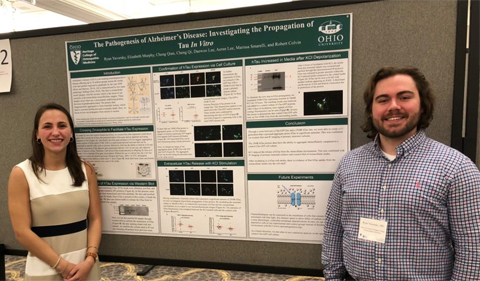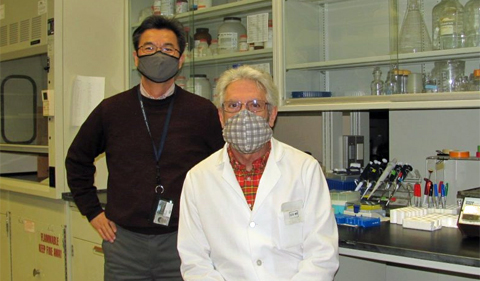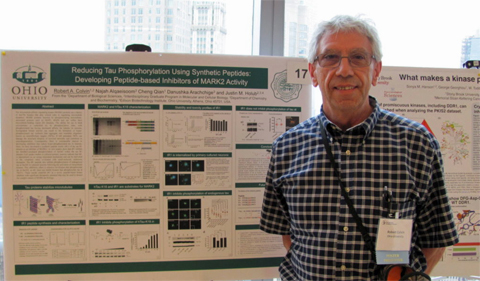
Ryan Yavorsky (right) is pictured next to his poster, which was awarded honorable mention at the OOA Symposium. Liz Murphy (left), 2018 graduate of Honors Tutorial College – Biological Sciences, worked in Dr. Colvin’s lab on similar research for her thesis.
Ryan Yavorsky presented research on tau protein and its role in the pathogenesis of Alzheimer’s disease at the Ohio Osteopathic Symposium held April 27 in Columbus.
Yavorsky is a second-year medical student in Ohio University’s Heritage College of Osteopathic Medicine and has worked in the lab of Dr. Robert Colvin, Professor of Biological Sciences. Colvin’s lab is investigating cellular mechanisms involved in dysfunction of tau protein a major component of neurfibrillary tangles, which are found in the brains of individuals suffering from Alzheimer’s disease. The Colvin lab is studying how tau protein is released from neurons and how neighboring neurons might be affected by tau release. The Colvin lab is collaborating with Dr. Daewoo Lee, Professor of Biological Sciences, in developing transgenic models in the model organism Drososphila.

Ryan Yavorsky (right) is pictured next to his poster, which was awarded honorable mention at the OOA Symposium. Liz Murphy (left), 2018 graduate of Honors Tutorial College – Biological Sciences, worked in Dr. Colvin’s lab on similar research for her thesis.
The Ohio Osteopathic Symposium is an event hosted by the Ohio Osteopathic Association and the Ohio University Heritage College of Osteopathic Medicine that provides lectures, Q&As, and other informative programs. The goal is to provide health care providers in Ohio with innovative, current knowledge on medical related issues. Not only does the symposium provide great educational opportunities, it also provides a place where health care workers can meet and share ideas. Within the four-day symposium, there is a poster competition where physicians, residents, and medical students can present their latest research. Besides honing the skills needed to present complex experiments to a variety of individuals, the poster competition was a great way to learn about up-and-coming changes in medicine and connect with similar minded physicians and students.
Yavorsky related that participating in research is exceptionally useful. For a student in medicine, most of the motivation while completing a project is rooted in application to patient care. This provides the research team with a novel perspective and can stimulate diverse ideas and directions. Even more, the Ph.D. counterparts’ ability to analyze each step of an experimental process and trouble shoot complicated problems provides medical students with a unique angle in which to confront problems outside of the lab. Finally, research requires its participants to read current journals and studies related to their field. This ability to parse through experimental protocols and results is crucial as it gives future physicians the ability to accurately interpret the most up-to-date discoveries in medicine.



















Comments